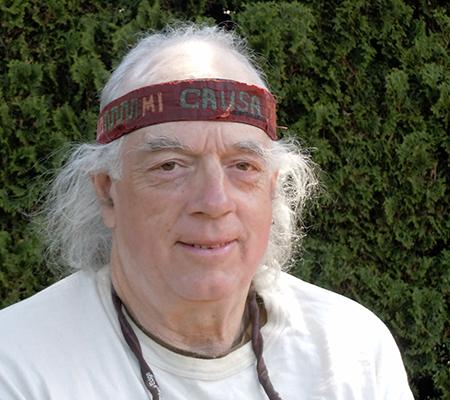
Hideous nature of the war exposed him to ugly realities of U.S. and Western imperialism
[This article continues CAM’s commemoration of the 50th anniversary of the end of the Vietnam War.—Editors]
On September 1, 1987, S. Brian Willson, a Vietnam veteran, was run over by a train outside the Concord Naval Weapons Station in Northern California while trying to block munitions shipments to the Nicaraguan Contras (right-wing counter-revolutionaries backed by the CIA).
Willson lost both of his legs and suffered brain damage.
After his miraculous recovery, he was greeted as a national hero in Nicaragua and also received a letter of apology from Ronald Reagan’s daughter, Patti Davis, who told him that she was sickened by her father’s “aggressively anti-Sandinista rhetoric” and “absurd reference to the Contras as freedom fighters.”[1]
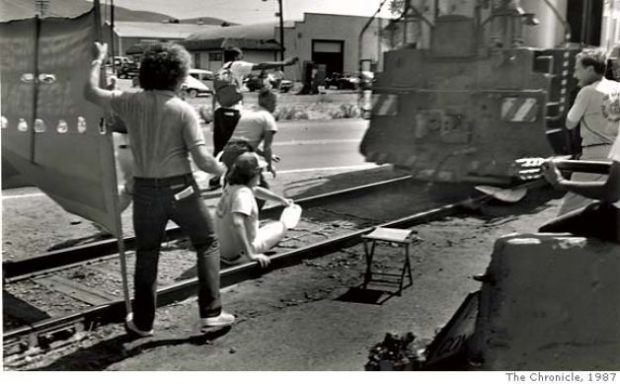
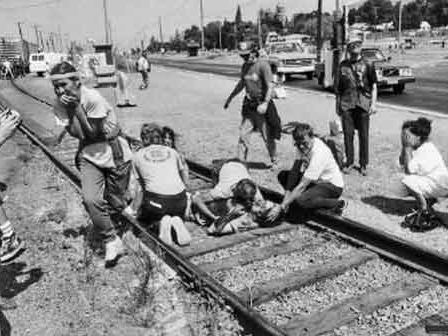
On March 2, Willson held court before a rapt audience in a Zoom webinar sponsored by the Nicaragua Solidarity Coalition.
Willson described his trajectory from an apolitical young man who grew up in a right-wing family in upstate New York to a lifelong peace activist who decided to live his out his golden years in Nicaragua in a display of solidarity with the Nicaraguan revolution and people.
Willson said that his father, a born-again Baptist, was a member of the John Birch Society, Ku Klux Klan, and American Nazi Party and stacked political pamphlets from all three groups in the family home where he grew up.
As a teenager, Willson was mostly into sports and not very political. In 1964, while studying for the ministry, he realized he was more of an independent thinker than most of his peers when he began questioning various aspects of Christianity.
After Willson decided to pursue a law degree and took a job working in the Washington, D.C., jail, he attended meetings of the Black Muslim groups in the jail, which opened him up to new ways of thinking. The Muslims spoke about their ancestors being lynched, which was a wake-up call for Willson who did not learn about the history of racial bigotry in the U.S. in his lily-white town.
Another wake-up call came from Willson’s mentor at the jail, the Director of Classification, who told him how he had observed U.S. military officers working with the Italian mafia to traffic drugs and other contraband as a military intelligence officer in Italy at the end of World War II.[2]
Willson said that his young, naïve mind was shocked at the time to learn about this.
When Willson was drafted into the military, he became something of a renegade in his unit when he refused to participate in a bayoneting drill.
On assignment with the Air Force, Willson was sent to a South Vietnamese village on April 14, 1969, to assess the success or failure of a recent U.S. bombing operation.
What Willson saw in the village changed him forever.
He was sickened by the sight of 120 to 150 people who had died a mere 45 minutes before.
One dead lady was surrounded by her three kids. Her eyelids had been burned off by napalm and she had a certain glow in her eyes that Willson said he would never forget.
At that moment, Willson experienced an epiphany that he said took him 20 years to process. He said he felt that the dead woman was his mythological sister, and he said that he still communicates with her and asks her opinion of things.
The other epiphany that Willson had was that he did not belong in Vietnam.
Later, after studying more history, he came to see the U.S. war as part of a 500-year pattern of Western imperialism—now called “globalization”—by which Western countries stole the land and resources of people around the world and violently subjugated and killed them whenever they tried to resist.
While in tears after seeing the dead bodies, Willson said that he turned to the South Vietnamese colonel working with him who had broken out laughing.
The colonel asked Willson why he was crying, and then said that Willson should be happy because they were communists that had been killed.
Willson, however, believed that whether the people were communists or not (and now he better understands that Vietnam’s communists were nationalists trying to transform their society in a more egalitarian way), they were human and he and others should be sad that they had died in such a terrible way. Furthermore, the people killed were mostly women and children.
Willson’s next assignment in Vietnam was to go to Tan Son Nhut Air Base to study U.S. Air Force bombing reports.
The reports specified the high volume of alleged Vietcong that had been killed. But Willson knew that most of the people listed as Vietcong were civilians who may or may not have supported the Vietcong—or National Liberation Front (NLF).
From what Willson saw, the U.S. policy was to target civilian villages and to count all the dead as Vietcong. He said that then-U.S. President Richard M. Nixon needed a high body count to validate his Vietnam policy and so the military complied by providing him with high body count totals.
Willson said that the horrible things that he witnessed in Vietnam turned him into a life-long peace activist. When he returned to the U.S., he graduated law school and worked as a lawyer, but could not stomach the sight of the American flag flying above the judge’s bench knowing what the U.S. had done in Vietnam.
Willson’s next job was as the director of a veterans’ outreach center in Greenfield, Massachusetts, where there was a high suicide rate.
In the mid-1980s, Willson began reading reports about U.S.-backed atrocities in El Salvador and Nicaragua that sounded a lot like what he witnessed in Vietnam.
The reports were in the now-defunct left-wing Guardian newspaper—not the mainstream media.
In January 1986, Willson traveled to Estelí, Nicaragua, after receiving a grant to study Spanish. While there, the Contras attacked three farming cooperatives and killed eleven campesinos.
Willson experienced déjà vu from Vietnam when he witnessed five or six of the dead bodies being brought into the cemetery in Estelí.
Upset and angry, he thought to himself: “This is how the West was won.”
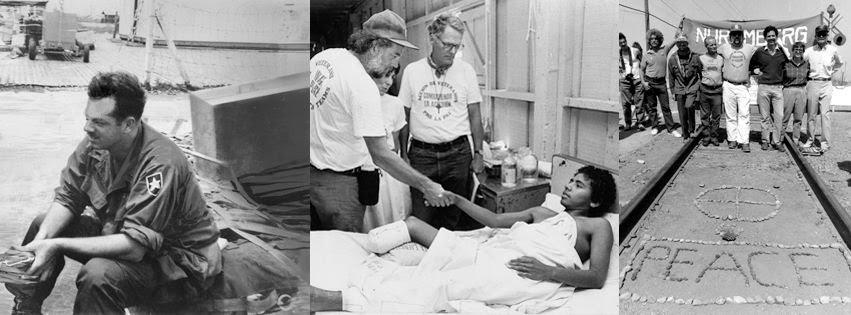
Between 1986 and 1990, Willson came back to Nicaragua 15 times as he was mesmerized by the Nicaraguan revolution and the country’s people. In 2014, he moved to Nicaragua permanently upon the invitation of President Daniel Ortega, a leader of the Sandinista revolution.
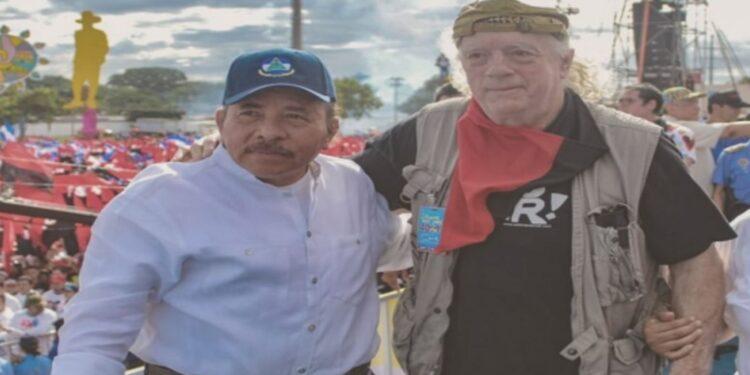
Rather than being a dictatorship as it is presented in the U.S. media, Willson said that Nicaragua is today a free society where there is a strong revolutionary and cooperative spirit and where the government prioritizes education and health care, which are free.
Willson’s decision to move was solidified by an incident when he was living in Portland, Oregon, at a health store where a man in the checkout line told the cashier that “we have to kill the sand-niggers” in Iraq.
Willson said that he realized then and there how deeply entrenched racism and imperialistic attitudes were in U.S. culture and that he would be happier living in a non-imperialist country where he could relate to most people better—even if he had never properly learned Spanish.
Willson said he knew a lot of good people in the U.S., but U.S. culture was sick at its core because people are conditioned to place material accumulation above everything else. Community solidarity and human empathy are in turn devalued.
The ruling class has no regard whatsoever for the feelings of people and deliberately keeps the people ignorant so they will not question or challenge them in any way.
Willson said that he himself was well-educated with a Master’s degree and half-way through law school when he was drafted to go to Vietnam, but that he really knew nothing—about Vietnam, or even his own country and its dark history.
Realizing his own ignorance after Vietnam, he decided he would try to learn from other people as much as he could.
Willson said that Trump’s election may in a way be a gift because Trump is so obnoxious and narcissistic that so many people cannot stand him and are thinking more critically about the government and the nature of power in America.
This could potentially lay the groundwork for the re-emergence of a real left-wing movement in the U.S. that challenges capitalism and the imperialistic policies that have caused so much misery—in Vietnam, Nicaragua and elsewhere around the world.

- See my review of Willson’s amazing memoir.
The Sandinistas were leftists who overthrew the corrupt Somoza dictatorship in spearheading Nicaragua’s 1979 revolution. Sandinista leader Daniel Ortega is currently Nicaragua’s president. ↑
Willson’s mentor had helped escort mafia boss Vito Genovese back to the U.S. Genovese had helped the allies fight the fascists in World War II. ↑
CovertAction Magazine is made possible by subscriptions, orders and donations from readers like you.
Blow the Whistle on U.S. Imperialism
Click the whistle and donate
When you donate to CovertAction Magazine, you are supporting investigative journalism. Your contributions go directly to supporting the development, production, editing, and dissemination of the Magazine.
CovertAction Magazine does not receive corporate or government sponsorship. Yet, we hold a steadfast commitment to providing compensation for writers, editorial and technical support. Your support helps facilitate this compensation as well as increase the caliber of this work.
Please make a donation by clicking on the donate logo above and enter the amount and your credit or debit card information.
CovertAction Institute, Inc. (CAI) is a 501(c)(3) non-profit organization and your gift is tax-deductible for federal income purposes. CAI’s tax-exempt ID number is 87-2461683.
We sincerely thank you for your support.
Disclaimer: The contents of this article are the sole responsibility of the author(s). CovertAction Institute, Inc. (CAI), including its Board of Directors (BD), Editorial Board (EB), Advisory Board (AB), staff, volunteers and its projects (including CovertAction Magazine) are not responsible for any inaccurate or incorrect statement in this article. This article also does not necessarily represent the views the BD, the EB, the AB, staff, volunteers, or any members of its projects.
Differing viewpoints: CAM publishes articles with differing viewpoints in an effort to nurture vibrant debate and thoughtful critical analysis. Feel free to comment on the articles in the comment section and/or send your letters to the Editors, which we will publish in the Letters column.
Copyrighted Material: This web site may contain copyrighted material the use of which has not always been specifically authorized by the copyright owner. As a not-for-profit charitable organization incorporated in the State of New York, we are making such material available in an effort to advance the understanding of humanity’s problems and hopefully to help find solutions for those problems. We believe this constitutes a ‘fair use’ of any such copyrighted material as provided for in section 107 of the US Copyright Law. You can read more about ‘fair use’ and US Copyright Law at the Legal Information Institute of Cornell Law School.
Republishing: CovertAction Magazine (CAM) grants permission to cross-post CAM articles on not-for-profit community internet sites as long as the source is acknowledged together with a hyperlink to the original CovertAction Magazine article. Also, kindly let us know at info@CovertActionMagazine.com. For publication of CAM articles in print or other forms including commercial internet sites, contact: info@CovertActionMagazine.com.
By using this site, you agree to these terms above.
About the Author

Jeremy Kuzmarov holds a Ph.D. in American history from Brandeis University and has taught at numerous colleges across the United States. He is regularly sought out as an expert on U.S. history and politics for radio and TV programs and co-hosts a radio show on New York Public Radio and on Progressive Radio News Network called “Uncontrolled Opposition.”
He is Managing Editor of CovertAction Magazine and is the author of six books on U.S. foreign policy, including Obama’s Unending Wars (Clarity Press, 2019), The Russians Are Coming, Again, with John Marciano (Monthly Review Press, 2018), Warmonger. How Clinton’s Malign Foreign Policy Launched the U.S. Trajectory From Bush II to Biden (Clarity Press, 2023); and with Dan Kovalik, Syria: Anatomy of Regime Change (Baraka Books, 2025).
Besides these books, Kuzmarov has published hundreds of articles and contributed to numerous edited volumes, including one in the prestigious Oxford History of Counterinsurgency .
He can be reached at jkuzmarov2@gmail.com and found on substack here.


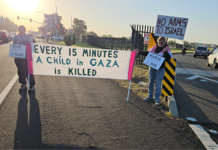
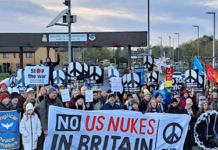
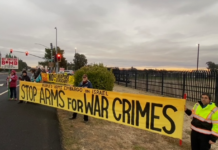
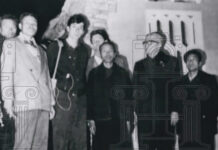
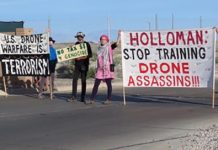

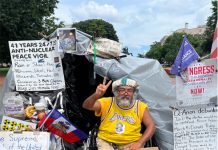
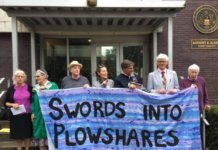

Thank you Ron! I agree.
So touching, Jeremy. You wonderfully brought forth the ethical beauty of this warm soul. It is ethics that we must stand for, and fight for. No matter our political differences within the real left, we who fight for our own rights while accompanying others struggling for their right to exist against the aggressors seeking profit and domination of the world.